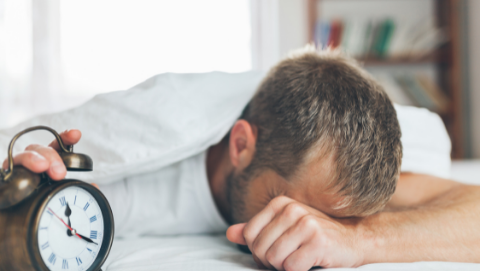March 15, 2022
Combat Sleep Deprivation to Improve Mental Health
By Spencer Downs, Intern, & Ashley Yaugher, PhD, Health and Wellness Faculty
March is National Sleep Awareness Month, so it is a great time to review the quantity and quality of your sleep habits. If you feel your sleep is not going well or you are not getting enough sleep, the good news is that you can work on it now. Here are a few ideas to help you improve your mental health through prioritizing quality sleep.
1. Plan to get enough sleep. It is recommended that adults get between seven to nine hours of sleep a night(3). Try setting an alarm to tell you to start getting ready for bed, so you get enough sleep. If you can’t get enough sleep, maybe it is time to change a habit in your life so you can go to bed earlier.
2. Turn your electronics off 30 minutes before bedtime. Blue light from electronic screens decreases the levels of melatonin in the body, which is the hormone that tells your body it is time to go to sleep(4). By turning off your electronics you are allowing your body to do its part to help you sleep better.
3. Limit caffeine. Caffeine can give you a boost of energy, but you should limit how much you have later in the day, or it can keep you awake when you want to be asleep. General guidelines suggest avoiding caffeine at least 6 hours before bedtime so that it won’t interfere with sleep.
4. Have a set routine. Studies show that those who go to bed and get up close to the same time everyday are more likely to have better mental health than those who sleep too little or too much(5). Keep your routine consistent during the weekdays and weekends by going to bed and waking up at the same times.
In a world where sleep deprivation is carried like a badge of honor, it is hard to prioritize sleep. Even though sleep won’t cure everything, having enough sleep can help you live a better, more fulfilling life. Learn more about the effects of sleep on your health, and other ways you can improve your sleep habits at https://www.sleep.org/ or The Nation Sleep Foundation.
References:
- Zhang, J., Paksarian, D., Lamers, F., Hickie, I. B., He, J., & Merikangas, K. R. (2017). Sleep patterns and mental health correlates in US adolescents. The Journal of Pediatrics, 182, 137-143.
- João, K. A. D. R., de Jesus, S. N., Carmo, C., & Pinto, P. (2018). The impact of sleep quality on the mental health of a non-clinical population. Sleep Medicine, 46, 69-73.
- Levi, R. (2022). “How Much Sleep Do You Need?” Nation Sleep Foundation, 7 Jan. 2022, https://www.sleep.org/how-sleep-works/how-many-hours-of-sleep-do-we-need/.
- Tähkämö, L., Partonen, T., & Pesonen, A. K. (2019). Systematic review of light exposure impact on human circadian rhythm. Chronobiology international, 36(2), 151-170.
- Zhai, L., Zhang, H., & Zhang, D. (2015). Sleep duration and depression among adults: A meta‐analysis of prospective studies. Depression and anxiety, 32(9), 664-670.


 Utah 4-H & Youth
Utah 4-H & Youth